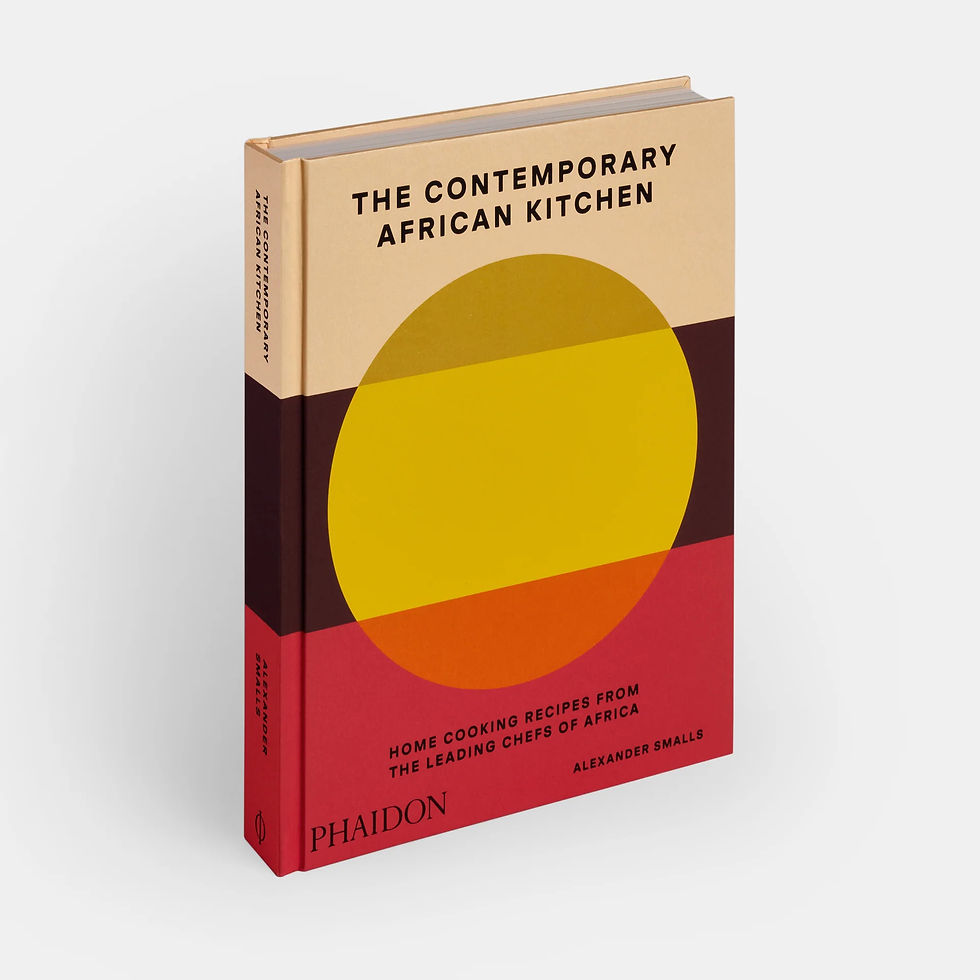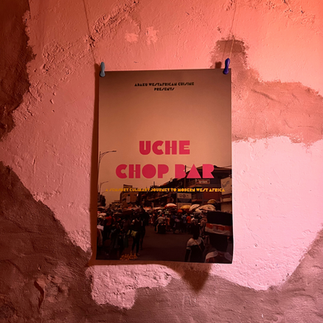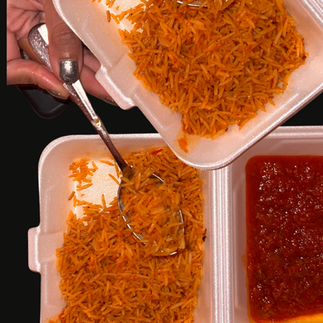Adaku’s Uche Experience 2.0: Lagos and Accra Stage a Culinary Dialogue in Zürich
- Tallulah Patricia B
- Sep 5, 2025
- 6 min read
How a ten-day pop-up is asking Switzerland to taste, listen, and see differently
Adaku.
In Igbo, it means “first daughter.”
In Zürich over the next 10 days, it means something else too.
A gathering.
An experiment.
A pop-up that insists food is never just food.
When Naomi Adaku Biaduo shared the name, it didn’t sound like branding. It sounded like memory — carried forward, claimed in the present. In the middle of preparations, she paused long enough to sit with me and speak about what was coming next: her upcoming event, ADAKU. Adaku is her second name, but also her claim: the first daughter of a vision that has been years in the making. From a cookbook in 2017 to the Uche Experience Vol. 1 — The Chop Bar, Naomi has been staging West African cuisine in fragments, each project testing how much of the culture Switzerland is ready to receive. On 5th September 2025 and over the next 10 days in Zürich, she brings it back: 2.0.

ADAKU.
The pop-up.
It shall not be polished to the point of hyper sterility. It is raw, layered, and fully alive.
A Nigerian chef, a Ghanaian DJ, and the Swiss-Nigerian curator join forces under the principle of Uche — “the senses.” The result is less restaurant (Kantine) than cultural encounter, less dinner than conversation.
It’s interesting how sometimes Switzerland's most inno-creative conversations don’t happen in Davos or Geneva or Basel’s art halls. Sometimes they happen around a table, with food eaten by hand, a beat in the background, and a welcome that says: come as you are. You belong.

What if a dinner could be more than a dinner?
What if a plate could be an archive, a beat an argument, and a room a portal between continents?
That is one question ADAKU asks over ten nights in Zürich, where Lagos and Accra meet Switzerland through food, sound, and space. An immersive experience and perhaps a culinary reminder that a shared meal remains one of the most powerful ways to reimagine the world.
Running September 5–14, 2025, ADAKU is the vision of Naomi Adaku Biaduo, the Swiss-Nigerian curator (with equal roots in Oberwallis) who has spent years building a bridge between West Africa and Switzerland through food. What emerges is not only a pop-up dinner but a culinary dialogue. Lagos and Accra staged in Zürich, asking Switzerland to reimagine its palate and its (food) migration politics.
Naomi Adaku Biaduo: Building the Foundation
Naomi’s work did not begin with this pop-up. Her journey started in 2017, when after years of experiencing West African food culture firsthand, she co-created a cookbook with chefs from across the region. The volume—now sold out—contained recipes from Ghana, Ivory Coast, Nigeria, Gambia, Senegal, and Sierra Leone. It was more than a recipe collection; it was a declaration. By codifying classic dishes in print, she laid the foundation for what would become her "first baby", ADAKU — West African Cuisine.

The next step was live staging. In Uche Experience Vol. 1 — The Chop Bar, Naomi curated an immersive event that recreated the communal, informal, and deeply social atmosphere of West African street dining. The Chop Bar format emphasized authenticity and collectivity: food eaten with hands, conversation as texture, music as pulse. It demonstrated what Naomi has always insisted: that eating West African is not just about the food, but about the entire sensory and social environment that frames it. ADAKU is her evolution of this ethos. Where the cookbook preserved recipes and the Chop Bar recreated atmosphere, the Zürich edition seeks to stage both memory and modernity at once. Naomi acts as cultural architect, ensuring that ADAKU is not just a dinner, but a carefully orchestrated act of hospitality, diplomacy, and dignity.
Chef Ikenna B. Akwuebue: African Avant-Garde Cuisine
At the heart of ADAKU’s kitchen is Chef Ikenna B. Akwuebue Bobmanuel, whose Nigerian roots and Ghanaian practice have positioned him as one of the most compelling new voices in African gastronomy.

A graduate of Red Dish Culinary School in Lagos, trained under Chef Nkesi Enyioha, and active with the Ghana Food Movement, Ikenna has built a career that blends ancestral knowledge with contemporary technique. He curates menus at Meet Me There Lodge, an eco-lodge on Ghana’s Volta coast, aligning his cuisine with sustainability, indigenous species, and regenerative agriculture. He also teaches at the School of Culinary Arts Ghana, mentoring the next generation of chefs. His inclusion in Phaidon’s The Contemporary African Kitchen situates him among the chefs defining the “new African table.”
As a co- author in Phaidon’s The Contemporary African Kitchen, Chef Ikenna stands among 33 chefs redefining African cuisine for global audiences. His work is not trend-driven but purpose-driven: to show that African food belongs not on the margins, but at the center of contemporary gastronomy.

Ikenna’s cooking philosophy is clear: to tell Africa’s culinary story without apology or dilution.
His Zürich menu begins with a traditional Igbo welcome dish—a symbolic threshold that signals belonging. Each subsequent course is rooted in heritage but plated with modernist clarity. For him, food is not only pleasure; it is cultural preservation and social change.
Muud Swingz: Sound as Archive
Counterpoint to the kitchen is Muud Swingz, Ghanaian DJ and cultural curator. Known for his longform sound score The History of Ghana—a three-hour sonic narrative created for artist Nana Danso Awuah-Asante’s exhibition—he treats music as archive. His appearances on Oroko Radio, NTS, Rinse FM, iMullar Sound System, and collaborations with artists such as Amaarae situate him at the heart of Accra’s cultural renaissance.
For Zürich, his sets are not entertainment. They are co-authorship. He is set to construct a soundscape where highlife meets electronic texture, where Ghana’s history and diasporic futures are braided together. Each course Ikenna serves is met by rhythm, and rhythm changes how the dish is experienced. Here, food and sound shall converse as equals.
Uche: The Senses as Method
Together, Naomi, Ikenna, and Muud Swingz stage Uche—“the senses”—as principle. Guests taste, touch, listen, smell, and see, each sense equally activated. The scenography, designed with Azou, reimagines textures from Ghana and Nigeria: sand underfoot, the geometry of shipping containers, fabric banners alive with color. Guests are invited to eat with their hands—reminding them that refinement is not porcelain, but intimacy.
In this staging, Zurich becomes porous. The room is no longer merely Swiss—it becomes a site of translation, where Accra and Lagos are carried across borders without being filed down for comfort.
The Politics Behind the Plates
But behind the immersion lies politics. Naomi’s first attempt to bring Ikenna and Muud Swingz to Switzerland was blocked at the border, their visas denied on grounds of “risk.” Only through persistence and coordination across Nigeria, Ghana, and Switzerland could they arrive. This is not incidental—it is structural (more via this perplexity insight link here )
Who gets to circulate, who is deemed legitimate, who is seen as suspect—these decisions shape which cultural stories can be staged.
Even the ticket price—CHF 89—carries weight. It includes not only courses and cocktails, but the cost of flights, accommodation, and, critically, fair pay. In a cultural economy where African artists are often asked to perform “for exposure,” Adaku refuses exploitation. Value here is not extracted; it is honored.
Switzerland as Stage, Switzerland as Test
The larger question is whether Switzerland is ready. In London or New York, decades of mid-range African restaurants paved the way for Michelin-level recognition. Zürich remains early in that journey. Adaku therefore functions as both offering and test.


Can Switzerland see West African cuisine not merely as sensational novelty, but as contemporary gastronomy?
Can it receive Ghanaian sound not as background, but as archive? Can it treat the presence of African artists not as exception, but as infrastructure?

Toward a New Cultural Contract
For the guest, Adaku is first an experience of joy: a beautifully plated dish, a rhythm that transforms the room, a moment of shared immersion. But beneath the joy lies proposition. That Switzerland’s cultural
future depends not only on hosting international art fairs and biennales, but on allowing diasporic culture to speak in the first person. ADAKU is not (yet) permanent. It does not claim to be. But for ten nights, it sets a precedent: Lagos and Accra placed at Switzerland’s table, not as sideshow but as equals.
Naomi’s work—from cookbook to Chop Bar to Uche Experience—shows that cultural diplomacy does not need summits or statements.
Sometimes, it needs a table, a DJ, a chef, and a room ready to be present and experience with all five senses.

















Comments